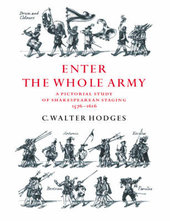
|
Enter the Whole Army: A Pictorial Study of Shakespearean Staging, 1576-1616
Paperback / softback
Main Details
| Title |
Enter the Whole Army: A Pictorial Study of Shakespearean Staging, 1576-1616
|
| Authors and Contributors |
By (author) C. Walter Hodges
|
| Physical Properties |
| Format:Paperback / softback | | Pages:196 | | Dimensions(mm): Height 246,Width 187 |
|
| ISBN/Barcode |
9780521311700
|
| Classifications | Dewey:792.9 |
|---|
| Audience | | Professional & Vocational | | General | |
|---|
| Illustrations |
61 Halftones, unspecified
|
|
Publishing Details |
| Publisher |
Cambridge University Press
|
| Imprint |
Cambridge University Press
|
| Publication Date |
2 December 2004 |
| Publication Country |
United Kingdom
|
Description
Walter Hodges enjoys a unique reputation as both illustrator and scholar of the Renaissance theatre. This book consists of fifty of his drawings, with accompanying text, which together reconstruct the original staging of scenes from Shakespeare's plays. It offers imaginative solutions to the puzzling questions which surround those early performances at the large public and smaller private theatres. Hodges creates visual explanations for specific scenes and incidents in the plays, such as Cleopatra's monument, or the siege of Orleans. He shows different uses of the 'discovery space' and upper stage, the creative use of stage posts and trap doors and the employment of special effects. With the rebuilding of the Globe Theatre on Bankside scholars, actors and directors are confronting again the problems of staging which Shakespeare's theatre provokes. Walter Hodges' ingenious and practical solutions will appeal to students and theatregoers alike.
Reviews'Walter Hodges has a unique blend of talents, seen at their best in this book. His long experience as a historian of the Globe and his rare devotion to the questions of visualising stage action in Shakespeare's plays have made a distinctive contribution to the New Cambridge series of editions of the plays. The book develops and extends the ideas suggested in his designs for those editions. They enhance many intriguing details about the early staging, while providing a distinctive overview of how the early stages worked.' Andrew Gurr
|